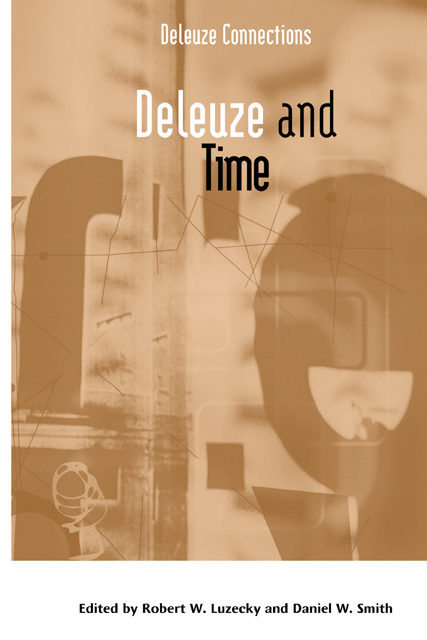9 - Memories of Cinema
Published online by Cambridge University Press: 13 April 2023
Summary
Deleuze’s concept of temporality undergoes radical revision with his elaborations of time’s expressions in cinema. In Cinema 1: The Movement-Image and Cinema 2: The Time-Image, Deleuze elucidates aspects of Bergson’s thought to present a concept of time that is no longer tethered to the movements of entities. Deleuze – in what is perhaps one of the oddest definitions in the history of western philosophy – characterises cinema as attempting to move beyond the representation of the movements of existents to give viewers a ‘direct presentation of time’ (1997b: 38). In the present chapter, I elucidate Deleuze’s tantalising suggestion that cinema, the art form that has moving images as one of its ontic bases, involves a direct representation of a sort of temporality that is conceptually discrete from the movement of existent entities. I further suggest that filmic expressions of time reveal it to be a singularity that enjoys the attribute of radical indeterminacy. Deleuze further suggests that time – as it is presented in film – obtains as that ongoing continuum of variation.
My argument progresses through four stages: (1) I will critically assess the suggestion of various commentators that the Cinema texts offer a fraught addition to Deleuze’s philosophy of time; (2) I suggest that Deleuze’s innovative reading of Bergson’s concept of duration is key to understanding how time is expressed in cinema; (3) I observe – through reference to Alain Robbe-Grillet’s theory of artistic descriptions – that a direct image of time enjoys nascent expression in the form of ‘pure optical and acoustic situations’ (i.e., moments of profound change in any of the diegetic elements of a film story); (4) finally – through reference to Deleuze’s nuanced reading of Bergson’s ontology of virtual and actual modes of existence – I suggest that time gains direct cinematic expression in the peculiar ‘crystal-images’ that proliferate in post-Second World War cinema. I observe that time’s expression in cinema involves a diminishment of the relative importance of the relation of temporal succession, a prioritisation of time’s involvement with fundamental ontological change, and a specification of the strictly simultaneous emergence of past and present. Further, I suggest that this temporality forms a continuum of variation without end.
- Type
- Chapter
- Information
- Deleuze and Time , pp. 179 - 212Publisher: Edinburgh University PressFirst published in: 2023



